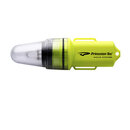- Messages
- 704
- Reaction score
- 61
- Location
- Winston, Georgia, United States
- # of dives
- I just don't log dives
Went for the dive and I'm pretty sure its the worst dive I've had. The vis was real bad, we got lost, didnt see the cool stuff my fiencee did (squid). But I'm glad I did go cause I got to see sleeping fish! OMG I didnt even know fish sleep. They were tucked up in sea weed sleeping away. Such a funny site.
Roll on the next one!
Cheers
Mike
While I am sorry that your second night dive did not go as well as the first, I think it does present a teaching moment. Night dives can be fun and exhilarating. There can be so much anticipation and anxiety about what you can see and what you can't during a night dive. Low viz/night diving requires special attention to detail and even more attention to buddysmanship. Getting lost can be an even bigger problem. You must be aware of your surroundings. Using a compass may help. Diving the site during the daytime might help. Carry at least 2 lights in case one of them floods or dies during the dive. Review light signals prior to the dive, especially emergency and attention getting signals. Review lost diver drills, especially as they pertain to night diving. Carry signal devices such as glow sticks, a whistle, or inflatable sausages. As you enjoy the wonderment of night diving, don't forget to practice safe and smart diving. Good luck on your next night dive.





